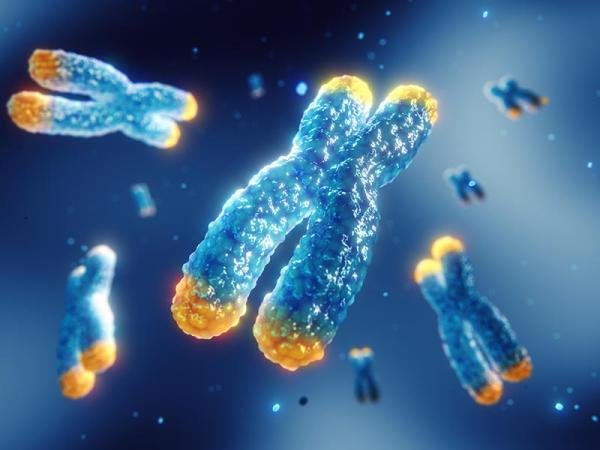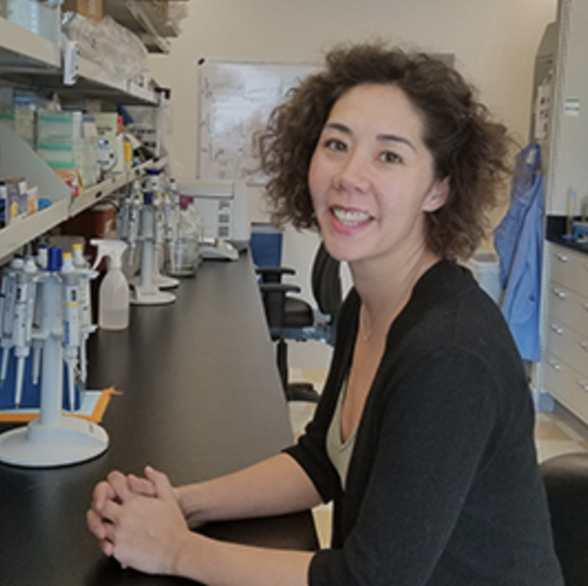Treatment Corrects Consequences of Accelerated Cellular Aging
Mouse Study Demonstrates Promise of New Therapy for Rare Genetic Conditions

Certain genetic mutations cause cells to age rapidly, leading to life-threatening health problems, but a new IRP study suggests a simple approach to alleviate some of those consequences.
If you ask a scientist how old you are, you may be surprised to get a different answer depending on who you’re talking to. That’s because age can be measured both ‘chronologically’ — in terms of time — and at a cellular level. Indeed, certain genetic mutations cause cells to age faster, leading to a host of health problems. Fortunately, a recent IRP study performed in mice suggests that boosting levels of a specific molecule could help alleviate some of those patients’ symptoms.1
While most of us track our age based on the passage of time, the age of our cells is more accurately gauged by the length of their telomeres, stretches of repetitive DNA sequences found at the end of the chromosomes into which our DNA is organized. Each time a cell replicates itself, its telomeres get shorter, until one day they become so short that the cell can no longer divide.
“Without the telomere, the ends of chromosomes look like DNA double-strand breaks and activate the DNA damage response,” explains IRP senior investigator Yie Liu, Ph.D., one of the new study’s co-senior authors. “This is harmful to cells because it activates downstream events that lead to cellular senescence, which means the cell doesn’t replicate anymore, and it also causes cell death and inflammation. That’s all detrimental for health.”
Most people don’t have to worry about any of that until they’ve lived a long life, but this isn’t the case for people with conditions collectively known as ‘telomere biology disorders.’ These patients’ telomeres are abnormally short for their chronological age, so they experience health conditions linked to aging much earlier in life, including a much higher risk for cancer. They often also have more immediately life-threatening symptoms like gastrointestinal bleeding and bone marrow failure, an ailment that leaves them unable to make new oxygen-carrying red blood cells and disease-fighting white blood cells.

When the telomeres at the ends of chromosomes become too short, cells are no longer able to copy their DNA, which prevents them from dividing.
Bone marrow transplants can help salvage patients’ blood and immune systems, but they are extremely intensive, logistically difficult procedures that aren’t always effective. Furthermore, they can’t help fix other ailing parts of the body, but a 2020 study co-led by Dr. Liu may have identified a treatment that can. The study found that cells from patients with a telomere biology disorder called dyskeratosis congenita had lower levels of a chemical called nicotinamide adenine dinucleotide (NAD) than cells from healthy individuals, and boosting NAD levels corrected many of the defects seen in the cells.2 These results prompted Dr. Liu to team up with IRP Stadtman Investigator Isabel Beerman, Ph.D., to investigate whether the same approach would improve the health of mice with extremely short telomeres due to one of the genetic mutations known to cause dyskeratosis congenita in humans.
"The groundwork that Dr. Liu had done on this was in cells that were taken from a human, but they weren’t in a living organism,” says Dr. Beerman, the new study's other co-senior author. “Her group thought that this intervention should work because we see it happening so nicely in cell culture dishes, so let’s try it in a mouse model. That’s where they recruited my group because we had just done a study looking at mouse models that had declining bone marrow function, and when we supplemented these mouse models with NAD, we found that many of the things that declined in those animals were improved.”

Dr. Yie Liu
In the new study, rather than giving NAD to the mouse models of dyskeratosis congenita, their drinking water was instead supplemented with nicotinamide riboside, which cells can convert into NAD. The intervention raised levels of NAD in the animals’ bone marrow and induced a small increase in the number of blood-producing stem cells in that tissue. In addition, the treatment reduced signs of DNA damage in certain immune cells, tamped down inflammation in the animals’ bodies, and reduced damage to their gastrointestinal tracts.
Where nicotinamide riboside really shined, though, was in the context of a bone marrow transplant. Four weeks after receiving bone marrow from genetically normal mice, mice with short telomeres that were given nicotinamide riboside had a much more pronounced correction in a phenomenon called ‘myeloid skewing’ compared to untreated mice. Myeloid skewing is an aging-induced imbalance of the different types of immune cells in the body, which increases individuals’ risk of certain blood cancers and leaves them more vulnerable to infectious diseases they have not been exposed to before. The mice given nicotinamide riboside also lived longer post-transplant than untreated mice, and more of the blood-producing stem cells in the transplanted bone marrow survived in their bodies.

Dr. Isabel Beerman
“These mice have very short telomeres and a lot of health problems, so they are very similar to the sorts of patients who would be receiving bone marrow transplants,” Dr. Beerman says. “When we treat these animals with nicotinamide riboside, we see a lot of extra benefits. When we give them healthy bone marrow in the environment of short telomeres, there’s improved soil for the donated cells to go into. We believe that the nicotinamide riboside is having this overall global effect in the animals that’s leading to an environment that’s just healthier and allows the transplant to have a more long-term, more successful effect.”
Ultimately, Dr. Liu and Dr. Beerman hope that a NAD-boosting treatment will not only make bone marrow transplants more effective in patients with telomere biology disorders, but also will have more widespread benefits throughout the body. To assess that possibility, the two IRP scientists plan to investigate nicotinamide riboside’s effects on other parts of the body besides the bone marrow and gastrointestinal tract, as well as test the treatment in mouse models with different mutations that lead to shortened telomeres.
“Our study was very focused on the bone marrow and blood, and then we just happened to see this beautiful gastrointestinal system benefit, so that was really suggestive that we could see improvements in other systems as well,” Dr. Beerman says. “The lungs and many different systems are affected by short telomeres, so we could do a deeper dive into how this affects other systems as well.”
Subscribe to our weekly newsletter to stay up-to-date on the latest breakthroughs in the NIH Intramural Research Program.
References:
[1] Stock AJ, Ayyar S, Kashyap A, Wang Y, Yanai H, Starost MF, Tanaka-Yano M, Bodogai M, Sun C, Wang Y, Gong Y, Puligilla C, Fang EF, Bohr VA, Liu Y, Beerman I. Boosting NAD ameliorates hematopoietic impairment linked to short telomeres in vivo. Geroscience. 2023 Feb 24. doi: 10.1007/s11357-023-00752-2.
[2] Sun C, Wang K, Stock AJ, Gong Y, Demarest TG, Yang B, Giri N, Harrington L, Alter BP, Savage S, Bohr VA, Liu Y. Re-equilibration of imbalanced NAD metabolism ameliorates the impact of telomere dysfunction. EMBO J. 2020 Nov 9;39(21):e103420. doi: 10.15252/embj.2019103420.
Related Blog Posts
This page was last updated on Wednesday, June 21, 2023
